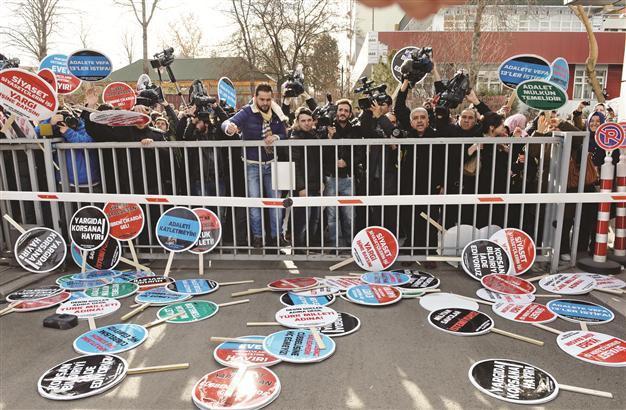Government plans to change Turkey's justice system
ANKARA

Ankara Jurists Platform hold a protest against the recent statements of the Supreme Board of Judges and Prosecutors (HSYK) in front of its building. DAILY NEWS photo
The government of Turkey is preparing for yet another extensive restructuring of the judicial system in a bid to escape from a massive graft investigation that has already pushed Prime Minister Recep Tayyip Erdoğan’s Justice and Development Party (AKP) into the corner.
The move by the government, which has suggested that it was fending off a “mini coup attempt” by elements in the police and judiciary who served the interests of foreign and domestic forces bent on humbling the country, comes around three years after a referendum which brought significant changes to the judicial system, that’s to say the Supreme Board of Judges and Prosecutors (HSYK), the Supreme Court of Appeals and the Council of State.
The modification of those key bodies was carried out within the context of Turkish constitutional reforms that were approved in a referendum in September 2010.
The move is highly likely to irritate the European Union as at the time, both the EU and the United States hailed the results from the referendum on a package of changes to the country’s military-era Constitution, with EU’s Enlargement Commissioner Stefan Füle describing the reforms as “a step in the right direction as they address a number of long-standing priorities in Turkey’s efforts towards fully complying with the accession criteria.”
HSYK first targetAccording to a Jan. 1 report by Turkish daily newspaper Radikal, the HSYK, which angered the government by delivering a statement on Dec. 26 and describing a new judicial police regulation obliging those carrying out investigations to inform superiors as “unconstitutional,” is the prior target of the government’s plan.
Nonetheless, today the government will not be as comfortable as it was when it initiated the reforms in 2010. To be able to make constitutional amendments, the ruling AKP will need support from both the main opposition Republican People’s Party (CHP) and the Nationalist Movement Party (MHP), which is not likely to be offered given the corruption probe.
There are only 40 days left before the Parliament goes into recess due to the local elections in late March. During this short period of time, the government will try to at least make some legal amendments which will limit the authorities of both the HSYK and the Council of State, Radikal reported, noting that a new referendum which would deal with changes to the judicial system was not on the agenda.
Given the difficulty of making these changes on their own, the government may resort to putting changes concerning the judicial system in a package which would also include arrangements that will pave the way for the release of jailed lawmakers, which would be relieving for those convicts and detainees in coup plot cases such as Ergenekon and Balyoz (Sledgehammer).
Backstage talks indicate that the AKP may initiate meetings with the opposition parties for such formulation after the New Year holiday. An option cited during these talks is making an arrangement for the appointment of a new “secretary-general” to the HSYK.
Key HSYK meeting on Jan 8 The 3rd Chamber of the HSYK will, meanwhile, hold a meeting on Jan. 8 in order to discuss the recent cross of swords between members of the judicial system, Turkish daily Hürriyet reported on Jan. 1.
Whether the prosecutors involved have been handling the corruption probe appropriately; whether they have violated the confidentiality of the probe; whether Zekeriya Öz, the Istanbul deputy chief prosecutor who supervised the prosecutors, is involved in inappropriate business relations at a municipality, as suggested by Prime Minister Erdoğan; and mutual accusations between Prosecutor Muammer Akkaş and Istanbul Chief Public Prosecutor Turan Çolakkadı will be on the agenda of the meeting which the newspaper described as a “surprise” meeting.
